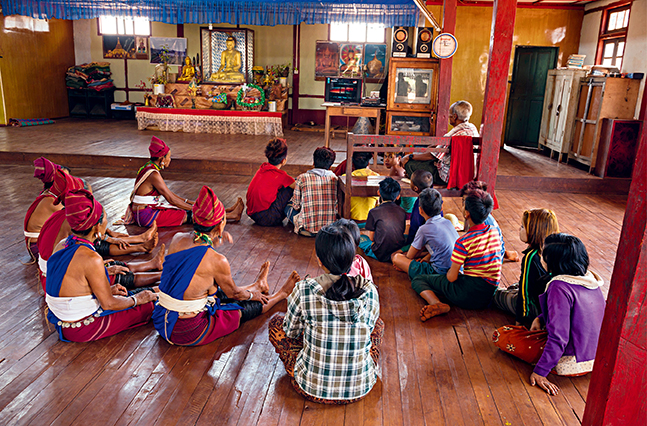
Locals watch TV in Daw Du Mar Gyi village, Kayah State of Myanmar.(MARC DOZIER)
Htike Lwin Ko from Myanmar graduated from Minzu University of China with a PhD in the Chinese language. The COVID-19 pandemic freed up his formerly busy schedule to afford him more time at home with his mother. They watched a lot of TV together and agreed that Chinese family dramas were their favorite. While enjoying family time, Htike Lwin Ko, who happens to work as the script translator of two popular Chinese TV shows, Jin Tailang’s Happy Life and Marriage Battle, would explain the young Chinese generation’s life philosophy to his mother as well as his thoughts and feelings about the translation process.
The 2013 premiere of Jin Tailang’s Happy Life on Myanmar Radio and Television (MRTV) made it not only the first Chinese TV series to air dubbed in Burmese, but the first dubbed TV drama ever to be broadcast in Myanmar.
“My mother doesn’t know much about the Chinese stars on these TV shows, but when it comes to characters and plot, she is quite an expert,” Lwin Ko smiled. According to him, many in Myanmar are attracted to dubbed Chinese TV series ranging from period dramas adapted from Chinese classics, such as Journey to the West, Dream of the Red Chamber, and Romance of the Three Kingdoms, to contemporary soap operas like Struggle, Ode to Joy, and The Untamed.
Enduring Popularity
One of the first foreign TV productions with subtitles to air in Myanmar, Journey to the West enjoys enduring popularity with many in the country. “In Myanmar, people are so familiar with that series that some can recite lines from it by rote,” said Ko. “We were deeply impressed with the thrilling plot and brilliant acting.”
Myanmar’s Ambassador to China U Myo Thant Pe is another big fan of Journey to the West. “I enjoyed that drama very much,” he revealed. “Many other Chinese TV shows are also popular in Myanmar, and to my surprise, they have helped many people gain a richer understanding of the Chinese language.”
In September 2019, a launch ceremony for Chinese TV productions screening under the theme “Memory of China” was held in Yangon, Myanmar. The event was jointly sponsored by the Chinese Embassy in Yangon, China Media Group, Myanmar TV station Sky Net, and Dehong TV Station from China’s Yunnan Province. As part of the screening, several outstanding productions, both dubbed and subtitled, aired on Myanmar TV, including historical dramas Journey to the West (1986) and Romance of the Three Kingdoms (1994) and the documentary series Hexi Corridor.
“Thanks to cooperation between broadcasting organizations from both countries, the dubbed versions of famous Chinese period dramas like Journey to the West and Justice Bao were able to reach a wide audience in Myanmar,” remarked U Ye Naing, director-general of the Information and Public Relations Department under the Ministry of Information of Myanmar. “I believe dubbed versions will also be popular because the Myanmar people’s love for these TV productions is true and enduring.”
“Since the original or subtitled versions were the only choice in the past, many in Myanmar are excited to finally be able to enjoy famous Chinese TV dramas dubbed in their own language,” said Htike Lwin Ko at the launch ceremony. The theme songs of Journey to the West and Romance of the Three Kingdoms were performed, and a fully costumed Monkey King appeared at the climax of the event to emcee a trivia contest on China’s Four Great Classical Novels.
About a month prior to the event, a launch ceremony of the Myanmar-language version of the Chinese period drama Dream of the Red Chamber (1987) was held in Nay Pyi Taw, capital of Myanmar. Chinese Ambassador to Myanmar Chen Hai said at the event that the cooperation on dubbing the TV series shined light on the profound cultural bonds shared by China and Myanmar. Myanmar Minister of Information U Pe Myint addressed the ceremony, noting that the broadcast of Dream of the Red Chamber in Myanmar provided an opportunity for the two peoples to better understand each other.
Shared Feelings
TV is particularly popular among women in Myanmar. After Jin Tailang’s Happy Life became a hit in the country in 2013, notable progress was made on producing dubbed versions of Chinese TV shows about modern China and common family life. Through shows like Marriage Battle, Romance of Our Parents and Ode to Joy, Myanmar viewers have found that lives of common people in China are like their own.
Directed by Zhao Baogang, Struggle is a groundbreaking work focusing on the lives of the young generation in modern China. The TV series follows a group of young people stepping out of their comfort zones to explore new possibilities in life. After being premiered on Chinese television in 2007, the drama became one of the most popular TV shows in China, prompting heated online discussion of the characters, dialogue, and costumes.
On January 12 of this year, the dubbed version of Struggle began airing during primetime in Myanmar. “Myanmar and China share similar cultural origins,” noted Thiri Shinn Thant, a well-known Myanmar actress and member of the dubbing crew. “Many scenes in the drama really resonate with Myanmar viewers such as those depicting working overtime, unaffordable housing, and the uphill fight for a decent life in big cities. The story of Struggle is exactly what many young people in Myanmar are experiencing today.”
Director Zhao Baogang said he produced the drama back in 2006 because he wanted to empower young Chinese people who felt lost about the future. “I hope this TV series can help boost the confidence of the young Myanmar generation to strive for their goals,” he added.
Ambassador Chen Hai remarked at the launch ceremony of the Burmese version of Struggle that the TV production is an accurate depiction of the lives of young Chinese urbanites that would deliver an inspiring message to Myanmar people endeavoring to promote national development.
Ode to Joy is another urban Chinese drama popular in Myanmar recently. It tells the story of four girls from various backgrounds who share an apartment and struggle for fulfilling lives in Shanghai. The stars of the show have all attracted huge followings in Myanmar. During a fan meet in Yangon early this year, leads Yang Zi and Qiao Xin were greeted with thunderous applause and cheering when they walked on stage. Flattered by the audience’s enthusiasm, Qiao Xin declared hope that the TV series would help Myanmar viewers better understand modern China.
Fruits of China-Myanmar Co-production
The dubbed version of Jin Tailang’s Happy Life has played an important role in promoting China-Myanmar cultural exchange. After watching the first two episodes of the TV series, then-Myanmar Ambassador to China U Tin Oo commissioned a counselor to deliver a handwritten letter to the producer of the dubbed version at China Radio International (CRI). The letter expressed appreciation to CRI for the efforts they made to promote friendship between the two countries. The same year, a DVD of the dubbed version of Jin Tailang’s Happy Life was presented as a national gift by Chinese State Councilor Yang Jiechi during his visit to Myanmar.
The first fruit of China-Myanmar joint dubbing, the Myanmar version of Jin Tailang’s Happy Life was elaborately produced with experienced voice actors. Well-known Myanmar actor Sithu Maung and actress Thiri Shinn Thant were invited to voice the roles of the male and female leads. Myanmar idol Paing Zay Ye Tun and Miss Myanmar 2013 Khin La Pyae Zaw also joined the voice cast.
Dong Jie was the executive producer of the dubbed version of Jin Tailang’s Happy Life. She did the voice work herself for several minor characters in the drama, so she has a good understanding of difficulties of the dubbing process. For instance, when one-page Chinese lines were translated into Burmese, they sometimes took up three pages. To keep the actor’s voice in sync with the lip movements, translated lines often had to be condensed. In addition, the Myanmar language is generally softly spoken, whereas many lines in the TV show were stiff and aggressive. “In the beginning we had to teach the Myanmar voice actors how to fight with each other,” Dong laughed. “They were all professionals at accurately presenting the roles and required emotions.”
In addition to co-dubbing, China and Myanmar also co-produced a TV series, The Legend of Dancing Prince, a milestone in media cooperation between the two countries. The period drama is based on the true story of Prince Shwenandaw of the ancient Kingdom of Pyu, a state in the valley of the River Irrawaddy in Myanmar. In the year 802, he visited Chang’an (today’s Xi’an, Shaanxi Province), the capital of the Tang Dynasty (618-907), and brought a troupe of musicians that were warmly welcomed in the city. The TV series The Legend of Dancing Prince is a faithful representation of China-Myanmar exchange in ancient times.
Renowned Myanmar director Sin Yaw Mg Mg was invited to oversee shooting in his country. He carefully selected well-known Myanmar actors to portray the king and queen of the Kingdom of Pyu. The language barrier was a big problem for the multinational cast. To overcome difficulties, the crew prepared scripts in Chinese, English, and Burmese.
Shot in Bagan, Myanmar, and Chinese cities and towns including Ruili, Jianchuan, Dali, Chuxiong, Kunming, and Hengdian, the drama traced the historical route of Prince Shwenandaw to recreate realistic outdoor scenes. The Legend of Dancing Prince finally wrapped shooting at Hengdian World Studios in eastern China’s Zhejiang Province in 2013, four years after the project was launched.
“The Legend of Dancing Prince is the first China-Myanmar co-produced TV series and the first major attempt at cultural cooperation between the two countries,” said former Myanmar Minister of Culture and Information U Kyaw San. “It has kindled comprehensive cultural exchange and cooperation between the two countries.”
From Journey to the West and The Legend of Dancing Prince to Jin Tailang’s Happy Life and Struggle, from period dramas promoting justice and integrity to urban dramas about modern East Asia and common family life, a lot of TV dramas are popular among both Chinese and Myanmar audiences. In recent years, the two peoples have enjoyed many of the same TV series with similar sentiments in their hearts.

A poster for The Legend of Dancing Prince.

A poster for The Untamed.

On January 15, 2020, stars of the Chinese urban drama Ode to Joy Yang Zi (far right) and Qiao Xin (far left) pose with fans during a meet-and-greet in Yangon, Myanmar. (ZHANG XIAOXI)

On January 15, 2020, stars of the Chinese urban drama Ode to Joy Yang Zi (second right) and Qiao Xin (second left) attend a meet-and-greet in Yangon, Myanmar. (ZHANG XIAOXI)


 Copy Reference
Copy Reference